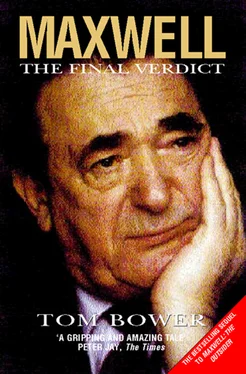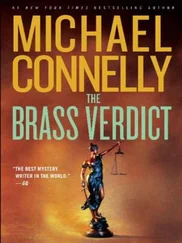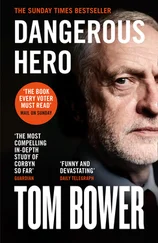Cook accepted this ‘offer’ too. He listed the Scitex and Invesco shares as part of BIM’s management of pension funds and removed Maxwell’s private £105 million debt from the accounts. But he failed to register the shares officially in Israel as owned by the pension fund. This, he explained, was ‘because I had signed a personal agreement with Robert Maxwell that he was holding the shares on BIM’s behalf. Even worse, he did not secure possession of the share certificates.
Maxwell’s complete control over BIM and the pension funds was, to his and Kevin’s increasing irritation, not duplicated at LBI, where a crisis had arisen among the directors. The cause was Mark Tapley, recruited as the new managing director in January 1990. Clean-cut, honest and ambitious to make his fortune in London’s rollicking financial markets, Tapley had been employed in the 1970s at J.P. Morgan and had been lured to LBI from Lehmans by Smith and Lord Donoughue on a generous salary for a three-year contract plus bonuses.
Within days of his arrival, Tapley had become alarmed by LBI’s administrative chaos, for which he blamed Larry Trachtenberg. He was also unhappy with Andrew Smith’s exaggerated claims about past performance and who, moreover, appeared to be trading in shares in what Tapley considered an unacceptable manner. ‘That’s a conflict of interest,’ he cautioned Smith. Soon afterwards, Smith returned to New York to establish LBI Inc. with £10 million capital provided by Maxwell, continuing his collaboration with Trachtenberg and Donoughue, although the latter referred to the American as ‘Adolf Smith’. ‘We must get rid of Trachtenberg,’ Tapley told Donoughue. ‘We must get him out of LBI.’ But Donoughue did not respond. By then, he had become Kevin’s confidant and no week passed without his name featuring in the Maxwell son’s diary.
On 1 April 1990, glancing at LBI’s 1989 accounts, Tapley noticed the high fees LBI was earning from the stock-lending programme. ‘Where are these fees coming from?’ he asked Trachtenberg. The American only replied, ‘It’s all done through Morgan Stanley with their guarantee.’ Tapley’s curiosity was not satisfied. Searching through the records of the stock lending, he came across the name of Thomas Christofferson, of Morgan Stanley. Christofferson was grateful to Kevin for placing LBI’s custodian business with his bank. It was an easy source of income. Until November 1991, Christofferson would, on demand from either Kevin or Trachtenberg, innocently sign letters and release share certificates which diverted the shares belonging to First Tokyo and others.
Although Tapley noticed that Trachtenberg was telephoning Morgan Stanley and ordering them to pledge First Tokyo’s shares to other banks as formal stock lending, reading LBI’s print-outs he was puzzled that they failed to identify the shares loaned. Instead, Trachtenberg’s oral instructions to Morgan Stanley were recorded on the computer only as ‘shares held on order of … bank’. Tapley demanded to know what was the authority for stock lending First Tokyo’s shares. ‘We’re doing it on Maxwell’s orders,’ stated Trachtenberg. He then added disingenuously: ‘We don’t know to whom the stock is being lent.’
Tapley’s initial concern had been that Trachtenberg was carelessly omitting to keep a record of his instructions to Morgan Stanley. By April 1990, he realized it was worse than that. His source was Jonathan Ford, a former Coopers accountant recruited by Maxwell to work in LBI. ‘I’ve been in the investment business for twenty years,’ said Tapley, ‘and I’ve never earned so much from stock lending. How do you do it?’
‘Because it comes from the Mirror Group,’ replied Ford with startling honesty.
Tapley gasped, ‘This is another conflict of interest. It will be forbidden by IMRO.’
Tapley appealed to Kevin. It was an unwelcome approach and Kevin repeatedly cancelled the appointment. When they finally met, Kevin agreed, ‘We must close that stock-lending operation down.’ But he made it clear that Tapley was no longer welcome in his office – he was disrupting the Maxwells’ operation. Of course the stock lending would not stop, but Kevin agreed with his father that it might be dangerous to dismiss the manager in breach of his contract. Better to keep him inside the tent and quiet. For his part, Tapley did not welcome the prospect of litigation with the Maxwells if he himself sought to break his contract, nor would he relish the loss of his high income in the middle of a recession.
Come July 1990, Tapley was still concerned by LBI’s stock lending of First Tokyo shares. ‘Why are you bothered?’ asked Trachtenberg. ‘It’s nothing to do with you!’ By then, Stuart Carson, LBI’s new compliance officer, responsible in the new self-regulatory era for ensuring fulfilment of statutory requirements, had consulted IMRO. The regulatory agency confirmed that IMRO rules did not forbid the conflict of interest prompted by stock lending. ‘It isn’t forbidden,’ reported Carson.
Two palliatives were proposed. Jean-Pierre Anselmini, MCC’s French deputy chairman, was that same July temporarily appointed an LBI director. Tapley’s initial relief disappeared when Anselmini began to postpone important meetings. ‘You’re intransigent,’ he told Tapley in stilted English, ‘making the management more difficult by distressingly insisting upon standards against Smith.’ Tapley’s appeals to Donoughue were also rebuffed. Urging self-restraint, the peer told him, ‘We must try and keep this together. We’re a good team.’ Donoughue was supported by George Willett: ‘Don’t go to IMRO. Stop making distinctions between moral and legal issues.’ Tapley was persuaded to keep quiet by three men whose motives he found unclear. Tapley accorded Donoughue the nickname ‘Manuel’, the character in the television sitcom Fawlty Towers famous for his repeated claim, ‘I know nothing.’
At the end of the day on 3 August 1990, after many cancelled meetings, Tapley was finally admitted once more into Kevin’s office. ‘The stock lending must stop,’ agreed Robert Maxwell. Satisfied that he had got what he wanted, Tapley distributed a memorandum describing a newly reorganized LBI which would exclude Smith and Trachtenberg. Two hours later, Kevin telephoned, his voice betraying deep anger: ‘That memo must be withdrawn. It’s premature.’ During that short interval, Kevin had understood the implications for the empire’s survival of Trachtenberg’s removal.
In the course of successive meetings in late October and November, Tapley was convinced by Kevin and Donoughue that LBI would be reorganized. ‘We’ll get rid of the Max Factor,’ both pledged, referring to the negative influence of Robert Maxwell. Tapley was relieved. But in reality he had been sidelined. The Maxwells’ priority was to silence their critic while they sought cash from any source to sustain their increasing debts. In September Kevin had committed himself to his father’s scheme of arrangement. Searching through BIM’s monthly schedule of shares owned by the pension funds, he had noticed the name Euris, a French investment fund. Euris, he knew, did not issue share certificates. Instead, the only proof of ownership were the records held by the company’s secretary. Transfer of ownership was settled by a simple letter notifying a sale.
On 3 September 1990, Kevin wrote, as a director of BIM, to Euris’s company secretary instructing that 2.2 million shares worth £32 million had been ‘transferred’ from BIM to Pergamon Holdings, a transfer which contravened the trust deed. (The board minutes were signed by Kevin, Ian and Robert Maxwell, with Anselmini as a witness. BIM’s articles required two signatures for a transfer.) On the same day, Kevin pledged the shares to BNP, the French bank, as collateral for a private loan. He then kept silent about the transfer. Trevor Cook, BIM’s manager, was not told, and Euris remained listed on BIM’s schedule as a pension fund share. By any measure, it was unauthorized, but it was a mere curtain-raiser to the increasingly drastic measures undertaken by Kevin to raise cash during October.
Читать дальше












